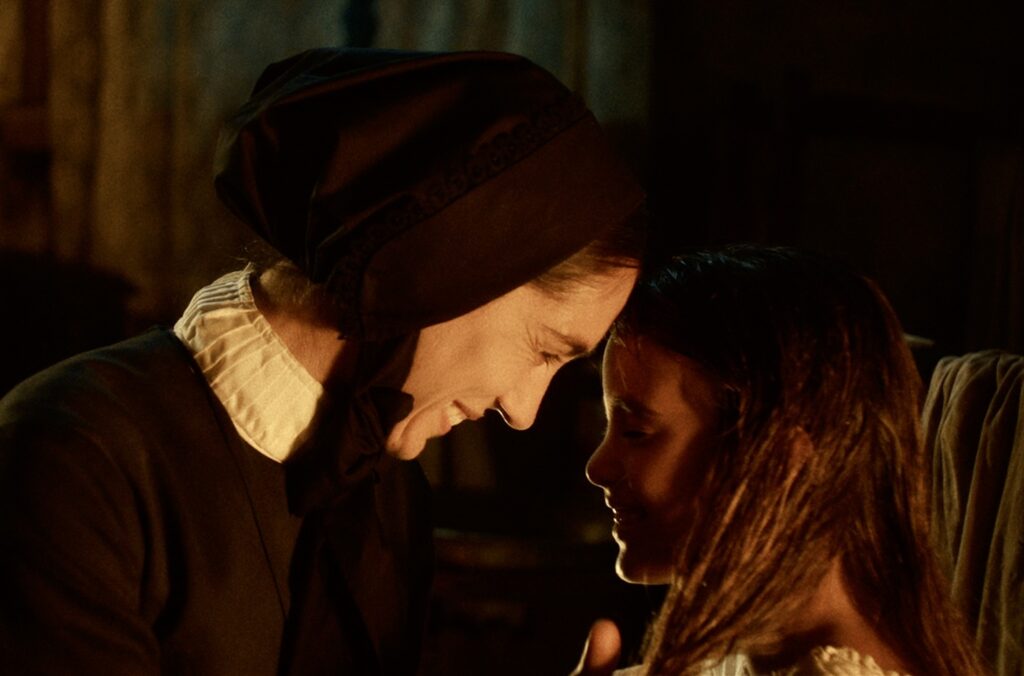
(***)
Today’s immigrant story is not so different from yesterday’s immigrant story.
Some New Yorkers may remember the name Cabrini Medical Center, a hospital that went through various incarnations and finally closed in 2008, along with many NYC health centers. That name has a lineage, and this biofilm traces it back to Mother Frances Cabrini, a nun who was born July 15, 1850, in the small village of Sant’Angelo Lodigiano near Milan, Italy. The youngest of 13 children, her goal was to become a missionary. As an adult she founded the Missionary Sisters of the Sacred Heart of Jesus, with a goal of doing work in Asia. They say plans are what god laughs at.
The faith-based production company Angel Studios surprised forecasters when it released the controversial film Sound of Freedom, which grossed $250+M at the box office in 2023. Hard to guess if this follow up will hit those numbers, but the appeal to faith-based, female, Catholic and Italian demographics is certainly obvious. The artistry of Mexican director Alejandro Monteverde (Sound of Freedom) has grown leaps and bounds since his last work. Cinematographer Gorka Gómez Andreu, production designer Carlos Lagunas, art directors Roberto Caruso, C.J. Simpson (John Wick) and Eric Whitney also have a big part in creating the gorgeous and evocative footage.
When Frances Cabrini (Cristiana Dell’Anna, Gomorrah) approaches Pope Leo XIII (Giancarlo Giannini, Seven Beauties), wanting to do missionary work in the Far East, he instead sends her to the West. To a run-down orphanage in New York City’s rough, crime-infested Italian immigrant section, Five Points. A ghetto bordered by Centre Street to the west, the Bowery to the east, Canal Street to the north and Park Row to the south. In 1889 Cabrini arrived, with her squad of sisters and immense desire to give safe refuge to children. The nun leader to her flock: “As women without men we will be expected to fail. More than ever, we must trust in ourselves.” The movie’s feminist philosophy fits the story.
Wisely, the script, by writer/direct Rod Barr (Sound of Freedom), puts hurdles in front of Cabrini’s goals. Most of the time the obstacles are jealous, envious and dream-crushing men. Sneering, in the most melodramatic ways, as they try to deter her, belittle her ambitions, degrade the women who assist her and box her in. There’s the Pope, New York’s Archbishop Corrigan (David Morse, The Green Mile), Senator Bodio (Federico Castelluccio, The Sopranos) and the evilest of them all, New York Mayor Gould (John Lithgow, The World According to Garp). Inner demons challenge the nun too. Graphic memories of nearly drowning haunt her and failing lungs are certain to shorten her life span and her activities. But she persists.
She’s loved by the children at the orphanage she continues to build. Wretches who once lived in dank, underground tunnels until she coaxed them out. Two stand out, the teen Enzo (Liam Campora) and little Pablo (Frederico Ielapi). Also, big-hearted Mother Cabrini takes a local prostitute under her wings, Vittoria (Romana Maggiora Vergano). A young woman who is constantly menaced and beaten by her demonic pimp Geno (Giacomo Rocchini).
The setting is very Dickensian, so much so that Pablo could be Oliver Twist—with a gun. Poverty, plague and crime are on view. Yet Cabrini and her growing team, like a messiah with disciples, do their duty. Her humble orphanage grows, hospitals are added to her portfolio. History charts her vision for helping others that resulted in her establishing schools, hospitals, orphanages and aid centers around the world. A Cabrini empire of giving—and all the institutions were run by women. A feat so worthy she was canonized by the Catholic Church in 1946—the first U.S. citizen to become a saint.
The drama unfolds with bits of shrewdly placed action, from shootings and stabbings to police breaking up fundraisers and buildings burning. Just enough to season the storyline and keep audiences guessing and engaged for almost all the 2h 25m length (editor Brian Scofield, Sound of Freedom). The film’s haunting feeling comes from its depiction of poor people’s struggles in times past, which are not so different from poor people’s struggles today. The anger and slurs hurled at Italian immigrants are the anger and slurs hurled at every new immigrant group before and after Cabrini’s times. The venomous politics played in this movie, by church and government officials, also seem all too familiar. Themes a savvy adult audience will recognize.
Certainly, Barr is becoming a master storyteller in the faith-based genre. He’s also adept at guiding his cast. The diminutive Dell’Anna never turns down the inner fire that drives the lead character. She’s brave, motherly yet fragile as she deals with defeat and teachable moments that become steppingstones. Giannini, Ielapi, Vergano and Rocchini also give solid performances. Jeremy Bobb, as the reporter Calloway, shines too. He plays Cabrini’s ally who helps her weaponizes journalism to overpower city government naysayers. His role will remind viewers of the era when good journalists shined a light on injustice. Back before the chaos of social media. Back before the internet and its dark alleys. The only weak interpretation is that of Christopher Macchio as an opera singer. He’s a decent tenor, but this sequence needed someone with a golden throat. The kind that would mesmerize the audience.
Cabrini doesn’t reinvent the bio/film genre, but is a solid addition to the faith-based category. Its theatrical release during this key period in the Christian calendar, should attract a core group of religious, female, Catholic and senior moviegoers. Compared to Sound of Freedom, this film is a better watch on all levels.
Trailer: https://www.youtube.com/watch?v=ZaMlUazXvyY
Visit Film Critic Dwight Brown at DwightBrownInk.com.